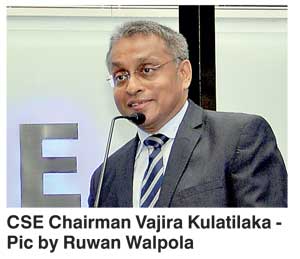Wednesday Feb 25, 2026
Wednesday Feb 25, 2026
Wednesday, 5 April 2017 01:54 - - {{hitsCtrl.values.hits}}
 By Charumini de Silva
By Charumini de Silva
The listing of sound state-owned enterprises (SOEs) in the immediate future is unavoidable in order to make the Colombo Stock Exchange (CSE) attract the sizable new funds required to lift the market to the next level of visibility among global investors.
Despite the fact that there are a lot of new funds coming in, CSE Chairman Vajira Kulatilaka said Sri Lanka was losing out on the opportunity as it was not looking at Colombo due to a lack of interesting or sizable stocks in the market.
“We need to get the SOEs which are fundamentally strong, the dollar board, big debentures taking place for the world to relook at CSE. There are quite a lot of new funds coming but they are not looking at Sri Lanka because the investors do not see anything exciting in the marketplace,” he added.
Citing some of the listed SOEs such as Asian Hotels, Ceylon Distilleries, Ceylon Oxygen, DFCC Bank and NDB, he pointed out that those firms added value to the market and turned around their performances to reach greater heights.
“You have to accept that the Government is big. Over 50% of the banking sector, 60%-70% of the energy sector, 70%-80% of the transport sector, 80% of the lands are owned by the State. SOEs are required at the CSE because of the size of the Government,” he noted.
While stating that listing SOEs on the CSE would enhance capital, transparency and good governance and reduce the Budget deficit among the institutions, he added that there were Government organisations which had not conducted audits for three to four years even to ensure if those institutes were making profits or not.
However, Kulatilaka stressed that these SOEs should be brought into the market on a commercial basis similar to what some socialist countries like China, Vietnam and India executed.
“If the Government is planning to hold 51% of the shares it will not attract investors, which will not bring the results we are talking about. That is where reforms are required,” he said.
He identified Singapore as a good example where they operate by giving prominence to independence at the board level and to the management, leadership and recruitment process.
Listing the reasons why SOEs were essential, he said that due to the prolonged civil war most companies could not expand their expectations. Hence, even if there were a few private companies that were performing well the private sector was still relatively small in Sri Lanka.
Kulatilaka said there were low-hanging fruits like People’s Leasing and Lanka Hospitals that the Government could consider in the first round.
“There are over five companies in the hospital sector to bid for; Lanka Hospital if the Government plans to release more shares to the market. If they do it, the market will go up and the rest of the SOEs will also follow. It is just the spark that is required. We have everything else in place,” he added.
Colombo Stock Exchange (CSE) Chairman Vajira Kulatilaka yesterday said that the country needed to adjust its currency systematically to bolster exports.
“We should gradually depreciate the currency because without that we cannot increase our exports,” he said.
He pointed out that East Asian tigers such as Singapore, Thailand and China devaluated their currencies systematically to achieve the respective export growth they required.
“You can systematically devaluate the currency to gain that economic advantage. Most of the countries did it, but we did not do it,” he added.
Kulatilaka stressed that it was important to have low interest rates and currency to support the exports taking place.
“A lot of exports have stopped because the currency has not been managed properly and interest rates are too high,” he noted.